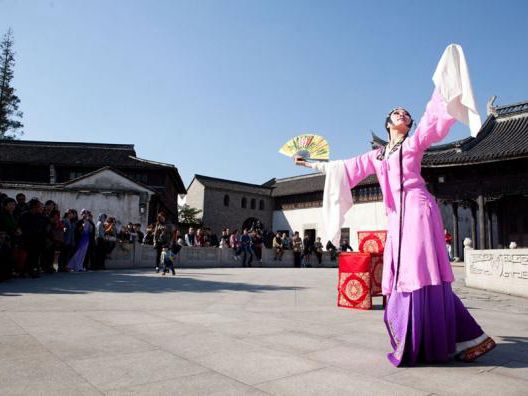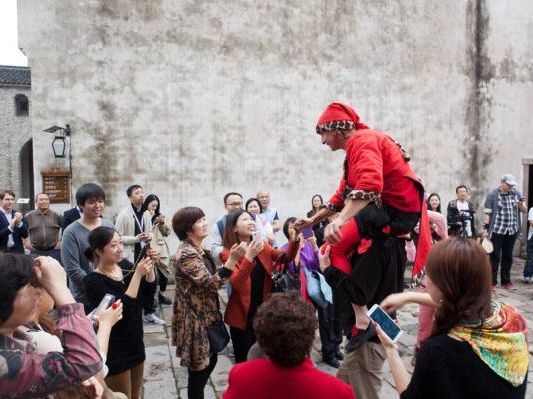
The green snake drinks the herbal wine, turns from her human shape back into a snake and disappears into the river. A white wall behind the stage, set in the middle of the water, is tinted with light and dark grayish smoky traces, creating the illusion of a Chinese ink landscape painting.
The 2-hour theatrical performance, "Green Snake," is adapted from a well-known Chinese legend, in which a white snake falls in love with a human scholar in Hangzhou of Zhejiang Province — not far from where the water theater is set in the reconstructed water town of Wuzhen.
Last Thursday's "Green Snake" marked the opening of the 2nd Wuzhen Theater Festival, which will end Sunday. Wuzhen, a place long known for contriving to embed its culture into the town, is on the road to becoming a top theater festival venue.
It is not alone. Hundreds of other canal towns around the country are trying to differentiate themselves through cultural tourism.
"Money first and culture lags behind — that's always how it is," says Stephen Chen, an experienced travel agent based in Shanghai. "In this affluent Yangtze River Delta area particularly, tourism has developed earlier and faster than the rest of the country, and also very successfully. Now many towns have been trying to add some cultural elements to tourism, for the sake of intangible value rather than blunt profits."
Shanghai's suburban town of Zhujiajiao in Qingpu District has been organizing culture/art-related activities since the beginning of the century, and the Zhujiajiao Water Village Music Festival has been steadily establishing a reputation. Last year, the town also hosted an outdoor staging of traditional Kunqu Opera "The Peony Pavilion," which sold out.
Tongli, a water town in Jiangsu Province, has been producing similar festivals and events and has a column called "Culture Tongli" on its website, a trend adopted by many towns.
The Edinburgh Festival Fringe and France's Festival d'Avignon are the most talked about when Chinese town officials talk about their ideal image and ultimate goal. Some people consider it only natural for these towns to carry on traditions that were cut off for dozens of years.
"In the past, maybe a hundred or even just 50 or 60 years ago, many towns had some performances every single evening, and it was only normal," says Chen Danqing, a renowned painter who spends most of his time living in Wuzhen now. "All these traditions were ruined by political movements, but it is good that the younger generation is getting interested in such activities again. It is back to normal just like how it was in the Qing (1644-1911), Ming (1368-1644) or Song (960-1279) dynasties, again. If we have thousands of such small towns doing exactly the same thing, it will just simply be wonderful!"
Wuzhen did not create the idea of adding cultural/art elements into tourism, but it has been known as one of the best-organized and most famous, especially after the first theater festival last year was surprisingly successful and influential.
"The ultimate principle of the festival, from its very beginning, is non-official and not-for-profit," says Huang Lei, producing director of the festival and a renowned TV and stage actor and director. "Wuzhen is the primary sponsor."

This primary sponsor has kept its word about not interrupting any artistic decisions.
"We are different because we are entirely privately run," Chen Yu tells Shanghai Daily. She is the deputy of the tourism company and the head woman behind the festival's operations, under a company called Culture Wuzhen.
"From every aspect, we are more independent, and we are more art-related. The artistic director, Stan Lai, is in charge of selecting the program," Chen says. "The artistic level of the program is our top priority. We have zero influence on him from the operational level. And he has done a spectacular job discovering the unique features of Wuzhen and blending them with the art of theatrical performances."
"Green Snake," the opening show, was turned from its original indoor version to the current outdoor one in the water theater, precisely for the sake of blending theater into Wuzhen. Like most parts of the town, the stage was designed and constructed precisely, with delicately carved wooden poles, carefully smoked traces on the wall, and newly built boats that faithfully reflect every little detail of the old boats. It was done in such a way that the outdoor "Green Snake" almost extended seamlessly from the stage into the town.
"Artists focus on the art and do it well; then good merchants will do a great job commercializing the art," says Lai, artistic director of the festival and China's leading playwright and stage director. "We have true respect for the town's originality and its primitive atmosphere, and we have tried our best to make this small town, its atmosphere, and its cultural and artistic elements available and sensible to all visitors."
The festival program has been praised for its well-conceived theme and organization, as well as for the quality and diversity of the shows from all over the world.
Opening with "Green Snake" by the National Theater of China, it will be closed with "The White Snake" from the Goodman Theater based in Chicago, adapted from the same folklore. The 17 featured shows display many recognizable names including Denmark's Odin Theater, one of the seminal experimental theater groups in Europe.
However, Huang, Lai and other masterminds of the festival are most proud of the Youth Theater Artist's Competition, which provides a platform for emerging stage artists to present their works and the carnival program that penetrates almost every corner and alley of the town.
"The festival learns from Avignon and provides a very good platform for young stage professionals like me — from the youth competition to the carnival performing teams, which make up for the fact that it is a small town that has yet to establish a scene of theatrical art like Shanghai or Beijing," says Chen Ran.
She is a Beijing-based journalist who reported the first festival and returned this year with a installation/performance art piece from the theater group STAGE NO MORE, of which she is cofounder and director.
"Go out and just wander on the street, take photos of those who are exposed to such performances for the first time," producing director Huang says. "That is the true essence of our festival."
|
|
||
 |
| Touched | Sympathetic | Bored | Angry | Amused | Sad | Happy | No comment |
Rhythm Media Group is a multi-media company, operating a US-based Chinese daily newspaper, The China Press, and the paper's website - uschinapress.com (which has mobile-app version), as well as a Beijing-based English website Sino-US.com. The group boasts 15 branch offices across the US, and a number of cultural centers focusing on culture-related business in the North America, Chinese mainland, Hong Kong and Taiwan.Launched in September 2012, the Sino-US.com is designed to serve as a bridge between China and the US, and to keep its readership inside or outside China better informed by providing news and insights on China's current affairs, culture, life, business, people and sports.
|
|